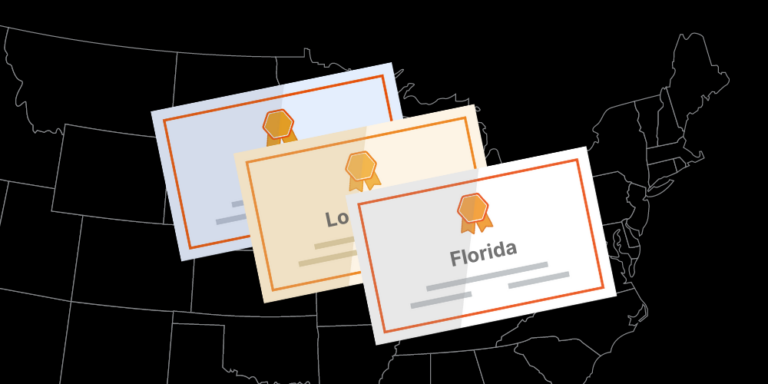

For many contractors, growing a construction business means taking on jobs in different states. Whether it’s to take a one-off project or to establish a new business location, working in a new state can open more doors. With some U.S. states offering contractor license reciprocity, there could be a lot of opportunities to simplify the process depending on where your business operates.
Table of contents
Contractor license reciprocity is when states recognize a license acquired in another state, without requiring the contractor to go through all of the steps to get a new license. Consider the way states treat your driver's license: You don't need to prove that you can drive in each state; each state recognizes the driver's license of every other state.
But getting a contractor license isn't always that simple. Depending on the state and the type of business you run, you most likely need to get a license to perform construction work in your state. Getting a license can be expensive and time-consuming, as some states require classes, years of experience, tests, and other stipulations to weed out unqualified license applicants.
Getting that contractor license is worth it — but it’s not something you’d want to do every time you perform work in a new state. For that reason, many states offer contractor license reciprocity. Instead of requiring a licensed contractor to go through the licensing process again, the new state recognizes the contractor’s license issued in another state. This saves the contractor time and money and allows them to get to work and expand their business faster.
On paper, license reciprocity can sound like an open-border policy, but that’s not exactly the case. Contractors licensed in one state cannot take whatever projects they choose in another state, even if it offers reciprocity.
In most cases, a contractor will still need to obtain a license for the type of work they’ll be performing in the new state. Contractor license reciprocity simply streamlines that process. Instead of producing proof of employment, proof of apprenticeship programs, college transcripts, and other paperwork, the reciprocal state allows the license to fulfill those requirements. However, the main advantage to reciprocity is not having to pay for, take, and wait for the results of another trade examination.
Contractors will still need to pay the appropriate license fees and meet any bond requirements that might exist within the state.
The best way to look at contractor license reciprocity is as a shortcut — it's not an automatic entitlement. You still have to qualify for reciprocity from a state that offers it. You should also realize that while many states won’t require a trade exam, some do require business exams before you qualify for a reciprocal license.
Also, some states will require you to hold your license for a certain amount of time — Florida requires 10 years — before you qualify for reciprocity. They’ll also require your license to be in good standing with the licensing board.
In some cases (such as in California), contractors need to forward the reciprocity form to their original issuing board for review. This is worth noting as it could be another step to take before qualifying for a reciprocal license.
Your company can carry as many licenses as you have the resources and desire to. For instance, if there are four states that recognize the license from your state, you can carry all four licenses as long as you pay the fees, fill out the required paperwork, and meet any bonding or exam requirements.
But just because a state doesn’t have a reciprocal agreement with your state doesn’t mean you can’t carry a license there. You’ll simply have to apply, meet the requirements, and take the full exam like any other contractor. Once you carry that license (through the typical route), you might qualify for licenses in states that have reciprocity agreements with that state.
It’s worth noting that getting a reciprocal license in one state does not automatically open the doors to obtaining reciprocal licenses in other states. For example, licensed electrical contractors in Oregon can receive a reciprocal license in Utah. That does not entitle them to apply for a reciprocal license in California through the reciprocal agreement between California and Utah. They will have to go through the same licensing process in those other states as any other contractors.
Subscribe to Blueprint, Procore’s free construction newsletter, to get content from industry experts delivered straight to your inbox.

Each state takes its own approach to contractor license reciprocity. Some states accept licenses from contractors in neighboring states, while some states will accept licenses from states across the country. On the other hand, some states don’t recognize licenses from other states at all, neighboring or otherwise.
Also, understand that certain states will offer reciprocal licenses for certain license types, but not all. A state might offer a reciprocal license to electricians from a particular state, but not plumbing contractors from that same state. It boils down to the agreements between licensing boards, and many states have a separate board for each trade.
These states do not offer reciprocity to contractors licensed in other states: